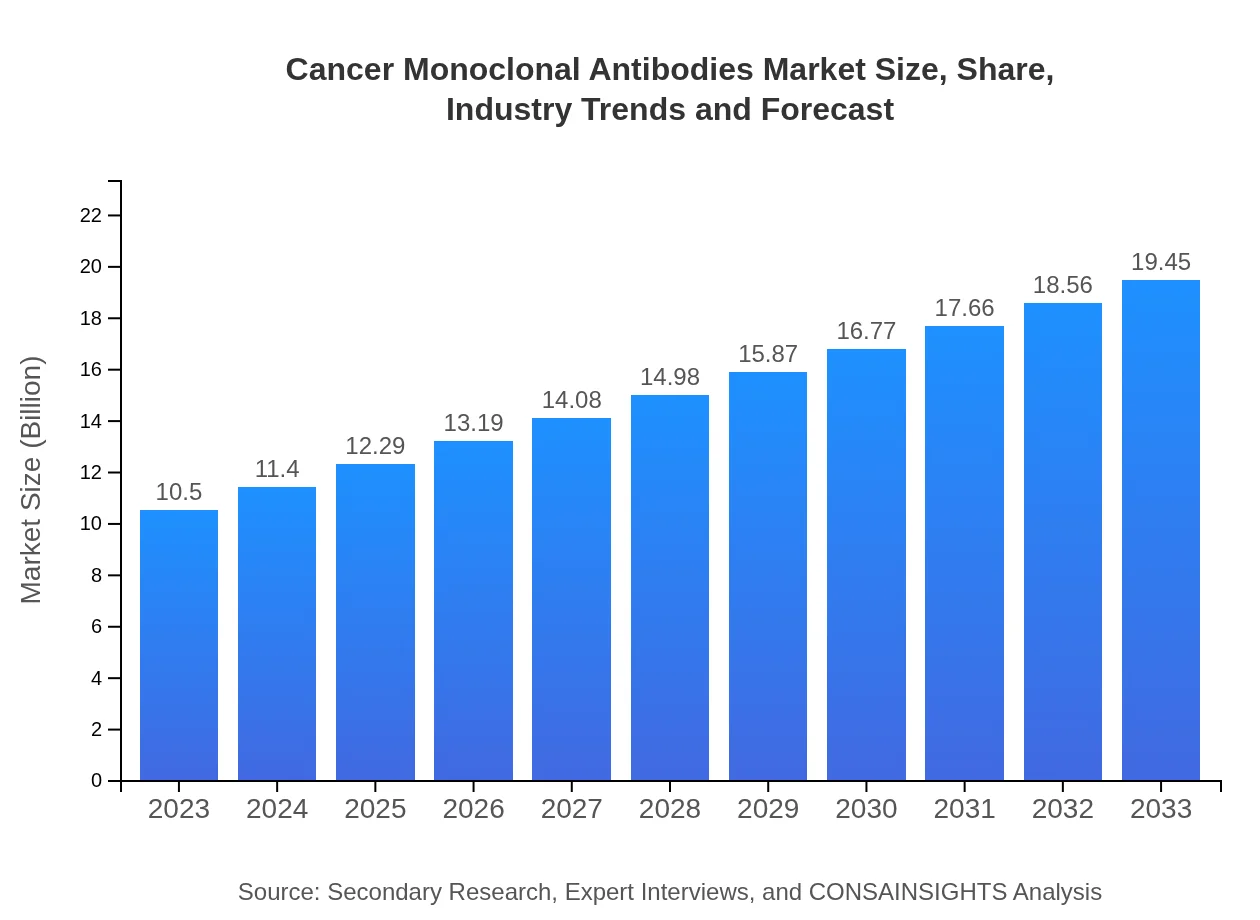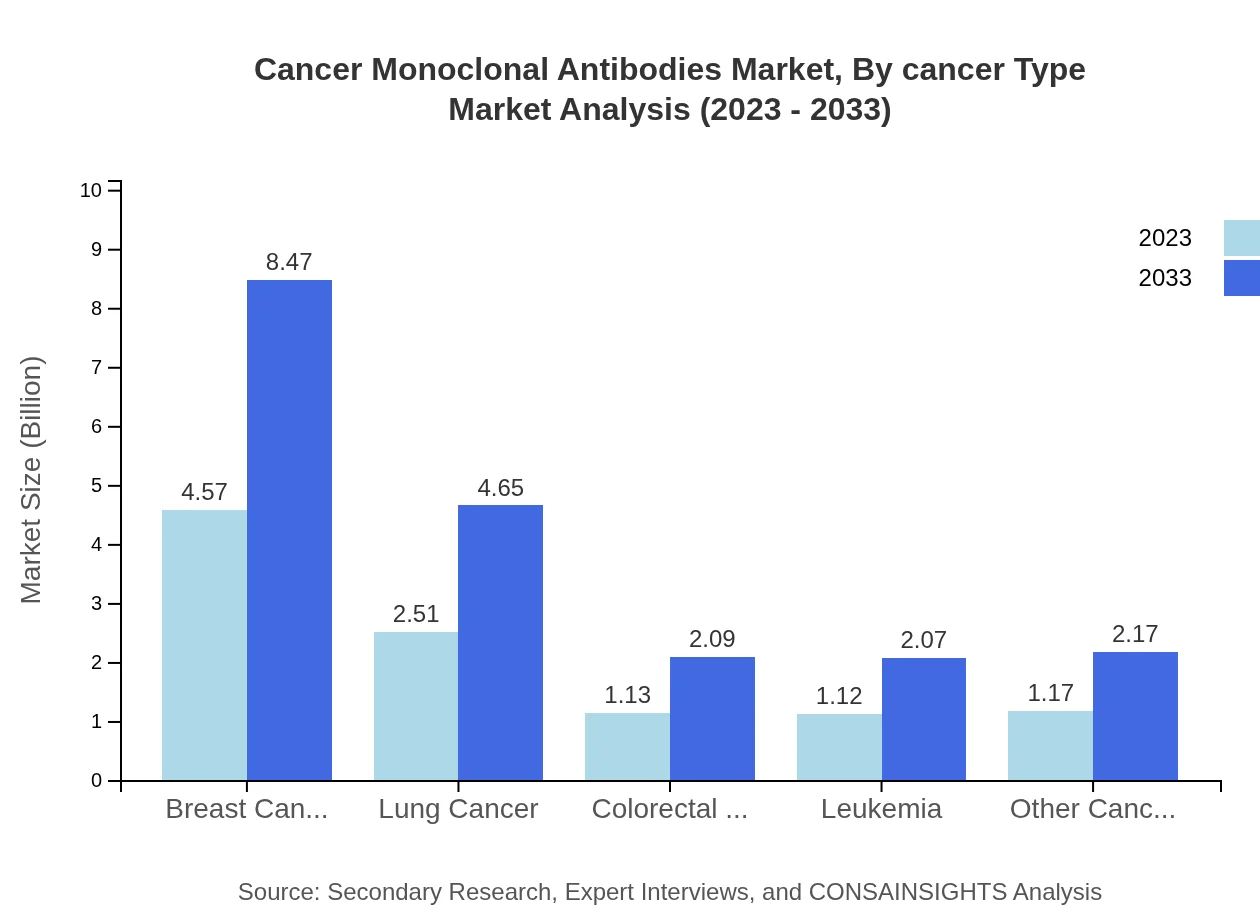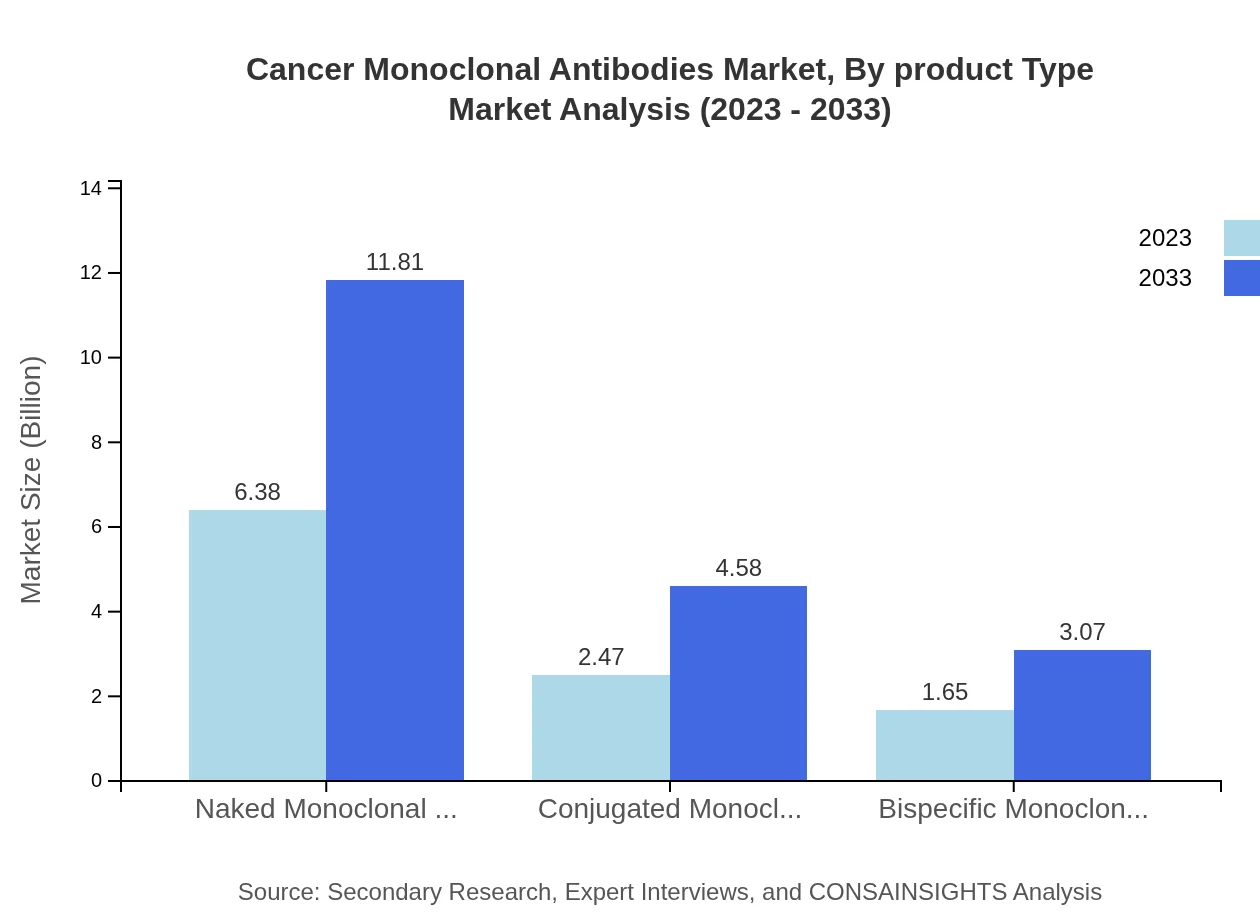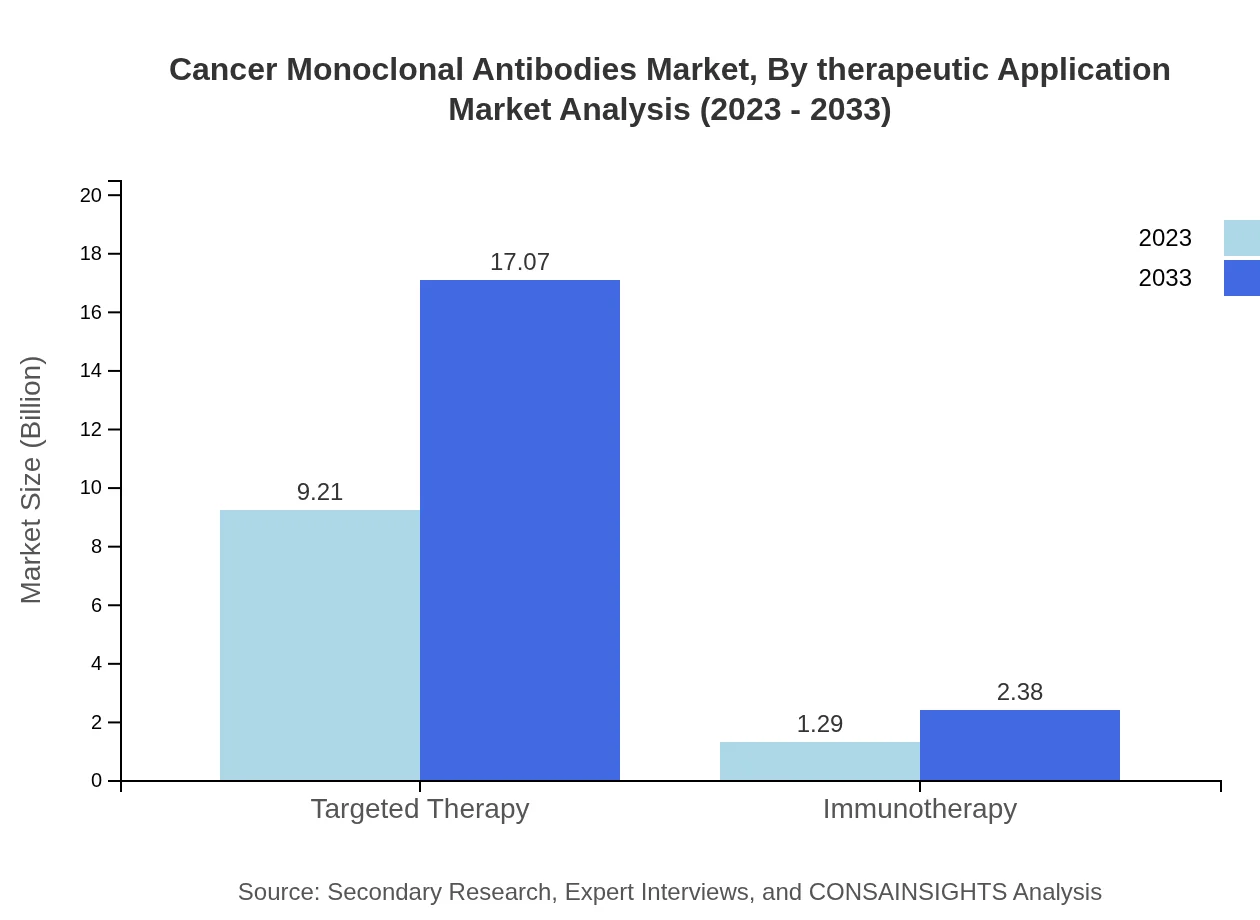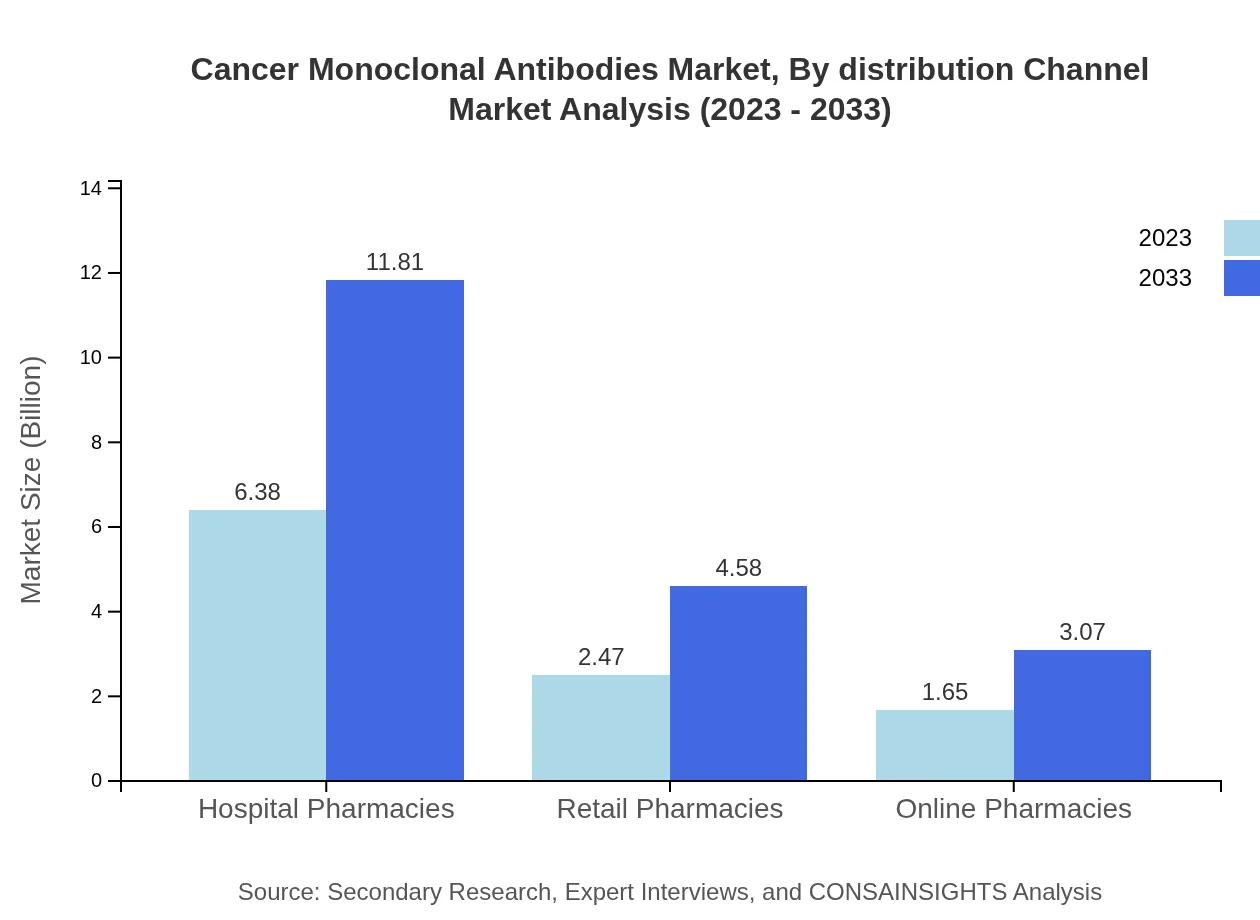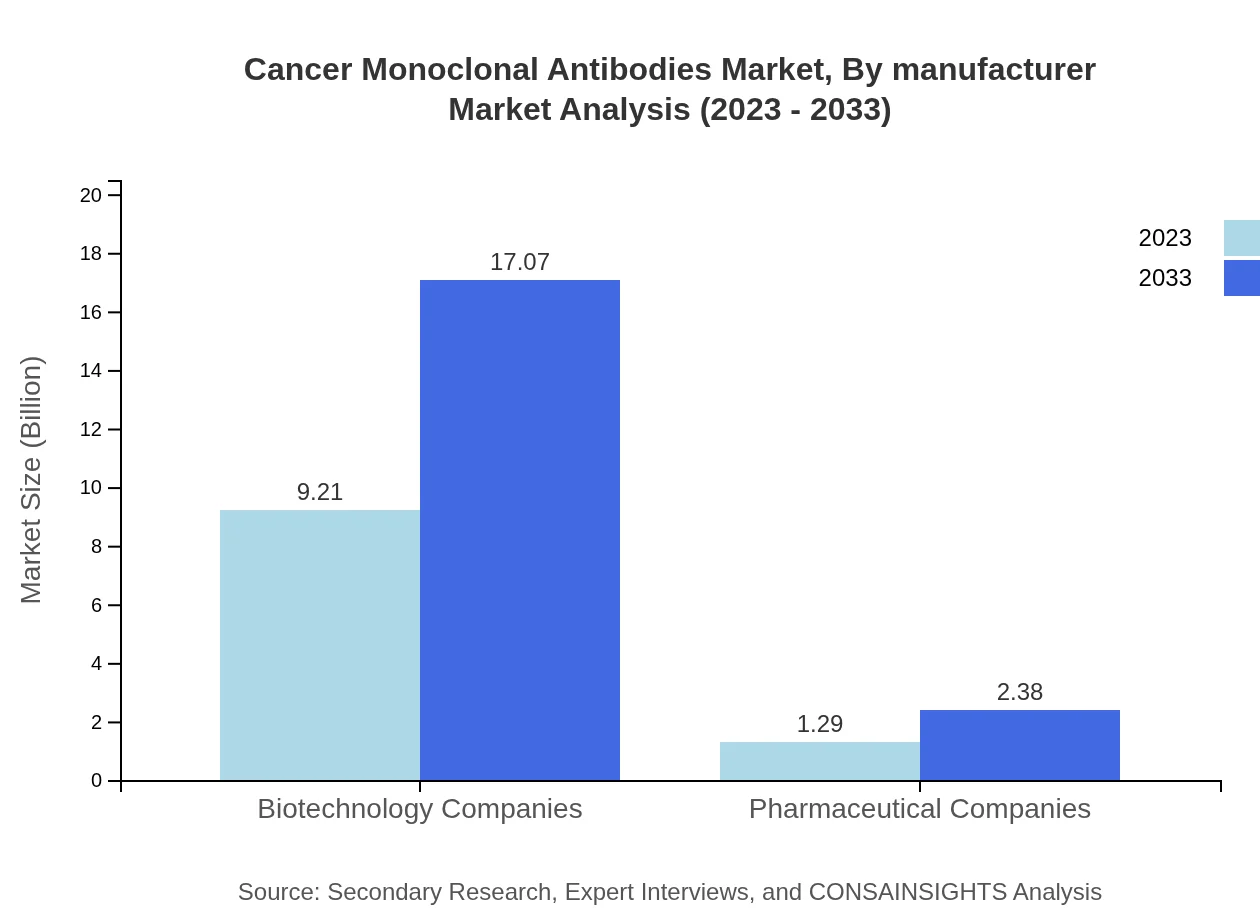Cancer Monoclonal Antibodies Market Report
Published Date: 31 January 2026 | Report Code: cancer-monoclonal-antibodies
Cancer Monoclonal Antibodies Market Size, Share, Industry Trends and Forecast to 2033
This report provides an extensive analysis of the Cancer Monoclonal Antibodies market, focusing on market size, growth trends, and forecasts from 2023 to 2033, alongside insights into the industry landscape and regional performance.
| Metric | Value |
|---|---|
| Study Period | 2023 - 2033 |
| 2023 Market Size | $10.50 Billion |
| CAGR (2023-2033) | 6.2% |
| 2033 Market Size | $19.45 Billion |
| Top Companies | Roche, Bristol-Myers Squibb, Pfizer , Johnson & Johnson, Novartis |
| Last Modified Date | 31 January 2026 |
Cancer Monoclonal Antibodies Market Overview
Customize Cancer Monoclonal Antibodies Market Report market research report
- ✔ Get in-depth analysis of Cancer Monoclonal Antibodies market size, growth, and forecasts.
- ✔ Understand Cancer Monoclonal Antibodies's regional dynamics and industry-specific trends.
- ✔ Identify potential applications, end-user demand, and growth segments in Cancer Monoclonal Antibodies
What is the Market Size & CAGR of Cancer Monoclonal Antibodies market in 2023?
Cancer Monoclonal Antibodies Industry Analysis
Cancer Monoclonal Antibodies Market Segmentation and Scope
Tell us your focus area and get a customized research report.
Cancer Monoclonal Antibodies Market Analysis Report by Region
Europe Cancer Monoclonal Antibodies Market Report:
Europe's Cancer Monoclonal Antibodies market is valued at $3.27 billion in 2023 with a projected growth to $6.07 billion by 2033. Increasing investments in cancer research and supportive EU regulations foster a conducive environment for market growth. Additionally, rising awareness about cancer treatment options is propelling demand for monoclonal antibodies across key countries.Asia Pacific Cancer Monoclonal Antibodies Market Report:
In the Asia Pacific region, the Cancer Monoclonal Antibodies market is valued at approximately $1.95 billion in 2023 and is expected to grow to $3.61 billion by 2033. This growth reflects increasing cancer rates, along with heightened healthcare expenditures. Countries like China and India are shifting towards advanced therapeutic solutions, influencing market dynamics. Furthermore, government initiatives aimed at improving healthcare infrastructure are expected to enhance accessibility to monoclonal antibody therapies.North America Cancer Monoclonal Antibodies Market Report:
North America holds a dominant position in the Cancer Monoclonal Antibodies market, valued at $4.01 billion in 2023 and anticipated to grow to $7.44 billion by 2033. Factors driving this growth include rapid adoption of innovative therapies, supportive reimbursement policies, and ongoing research initiatives. The presence of leading pharmaceutical companies in the U.S. significantly enhances technological innovations in the market.South America Cancer Monoclonal Antibodies Market Report:
The South American market for Cancer Monoclonal Antibodies is presently valued at $0.92 billion in 2023, with projections to reach $1.7 billion by 2033. The gradual adoption of advanced cancer treatments, alongside increased public awareness about cancer, contributes to market growth. However, challenges such as inconsistent healthcare policies and economic instability may affect market expansion.Middle East & Africa Cancer Monoclonal Antibodies Market Report:
In the Middle East and Africa, the Cancer Monoclonal Antibodies market is valued at $0.34 billion in 2023, expected to reach $0.63 billion by 2033. Despite challenges pertaining to healthcare infrastructure and accessibility, rising incidence rates of cancer and ongoing public health initiatives are expected to drive growth, particularly in urban regions.Tell us your focus area and get a customized research report.
Cancer Monoclonal Antibodies Market Analysis By Cancer Type
Breast cancer remains the leading segment, valued at $4.57 billion in 2023, and anticipated to reach $8.47 billion by 2033, accounting for approximately 43.54% market share. Other significant segments include lung cancer, projected to grow from $2.51 billion to $4.65 billion with a 23.9% market share, and colorectal cancer showing growth from $1.13 billion to $2.09 billion at 10.74% market share. Leukemia and other cancers also represent notable market segments with a steady increase in their respective market sizes.
Cancer Monoclonal Antibodies Market Analysis By Product Type
The market is primarily composed of naked monoclonal antibodies, valued at $6.38 billion in 2023 and expected to grow to $11.81 billion by 2033, representing a significant 60.72% market share. Conjugated and bispecific monoclonal antibodies also display growth, with projected market sizes of $2.47 billion and $1.65 billion in 2023, reaching $4.58 billion and $3.07 billion respectively by 2033.
Cancer Monoclonal Antibodies Market Analysis By Therapeutic Application
Targeted therapies account for the majority of market share at 87.76%, equating to $9.21 billion in 2023 and expected to increase to $17.07 billion by 2033. Immunotherapies, while smaller in comparison, are set to grow from $1.29 billion to $2.38 billion, indicating an increasing recognition of their value in modern cancer treatments.
Cancer Monoclonal Antibodies Market Analysis By Distribution Channel
The Cancer Monoclonal Antibodies market distribution is predominantly through hospital pharmacies, valued at $6.38 billion in 2023 and projected to expand to $11.81 billion by 2033. Retail and online pharmacies also play significant roles, representing about 23.52% and 15.76% of market share respectively. This dynamic distribution landscape reflects the need for improved accessibility and convenience in drug procurement.
Cancer Monoclonal Antibodies Market Analysis By Manufacturer
Biotechnology companies dominate this segment, valued at $9.21 billion in 2023 and expected to reach $17.07 billion by 2033 with a market share of 87.76%. Pharmaceutical companies, while smaller, are also growing, currently accounting for a share of 12.24%. The competitive landscape remains vibrant with ongoing mergers, acquisitions, and collaborations fostering innovation.
Cancer Monoclonal Antibodies Market Trends and Future Forecast
Tell us your focus area and get a customized research report.
Global Market Leaders and Top Companies in Cancer Monoclonal Antibodies Industry
Roche:
A leader in oncology, Roche provides a wide range of monoclonal antibodies, significantly impacting cancer treatment paradigms globally.Bristol-Myers Squibb:
Known for its pioneering immuno-oncology therapies, Bristol-Myers Squibb is widely recognized for its contributions to the monoclonal antibodies market.Pfizer :
Pfizer focuses on innovative treatments including monoclonal antibodies, committing substantial resources to oncology research and development.Johnson & Johnson:
Through its subsidiary Janssen Pharmaceuticals, Johnson & Johnson develops and markets a range of monoclonal antibodies for various cancer types.Novartis:
A significant player in the oncology space, Novartis engages in the development of targeted monoclonal antibody therapies, enhancing cancer treatment options.We're grateful to work with incredible clients.









FAQs
What is the market size of cancer Monoclonal Antibodies?
The global market for cancer monoclonal antibodies was valued at approximately $10.5 billion in 2023, with a projected compound annual growth rate (CAGR) of 6.2% expected to extend to the year 2033.
What are the key market players or companies in the cancer Monoclonal Antibodies industry?
Major players in the cancer monoclonal antibodies market include leading biotechnology and pharmaceutical companies that focus on drug development for cancer therapies. Their innovations and collaborations are pivotal in advancing treatment options.
What are the primary factors driving the growth in the cancer Monoclonal Antibodies industry?
Key growth factors include increasing cancer prevalence, advancements in biotechnology, and a rising focus on personalized medicine, contributing to enhanced patient outcomes and expanded therapeutic applications in oncology.
Which region is the fastest Growing in the cancer Monoclonal Antibodies?
The Asia Pacific region is anticipated to achieve significant growth within the cancer monoclonal antibodies market, projected to escalate from $1.95 billion in 2023 to $3.61 billion by 2033, reflecting robust investments in healthcare.
Does ConsaInsights provide customized market report data for the cancer Monoclonal Antibodies industry?
Yes, ConsaInsights offers tailored market report data for the cancer monoclonal antibodies industry, ensuring that specific client needs and regional insights are effectively addressed for informed decision-making.
What deliverables can I expect from this cancer Monoclonal Antibodies market research project?
Expect comprehensive deliverables including industry analysis, market forecasts, competitive landscape assessments, segmentation data, and actionable insights tailored to your strategic objectives.
What are the market trends of cancer Monoclonal Antibodies?
Current trends include the rise of biosimilars, increased adoption of immunotherapy treatments, and a shift towards targeted therapies, reflecting the industry's evolution in response to patient needs and technological advancements.

